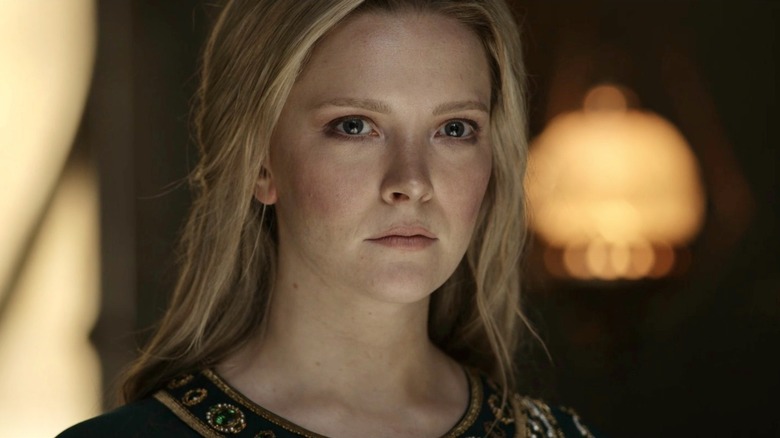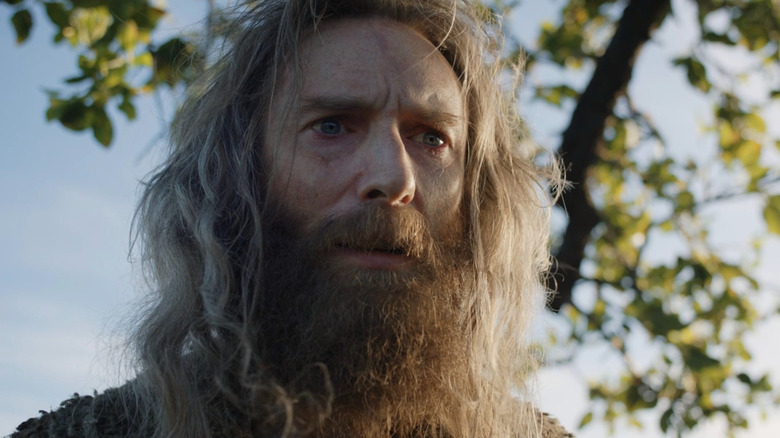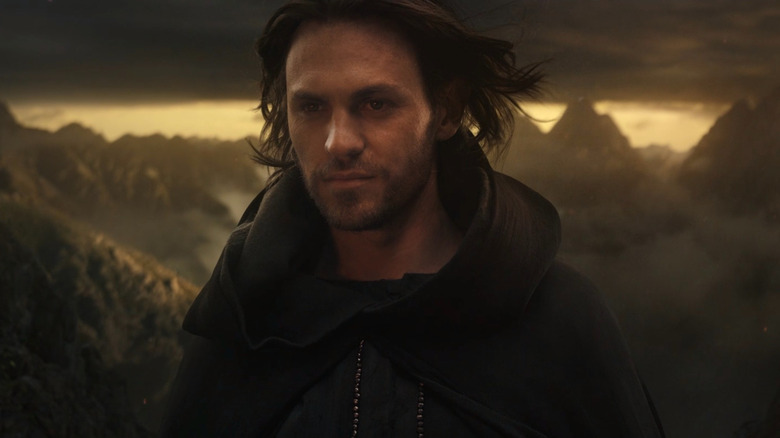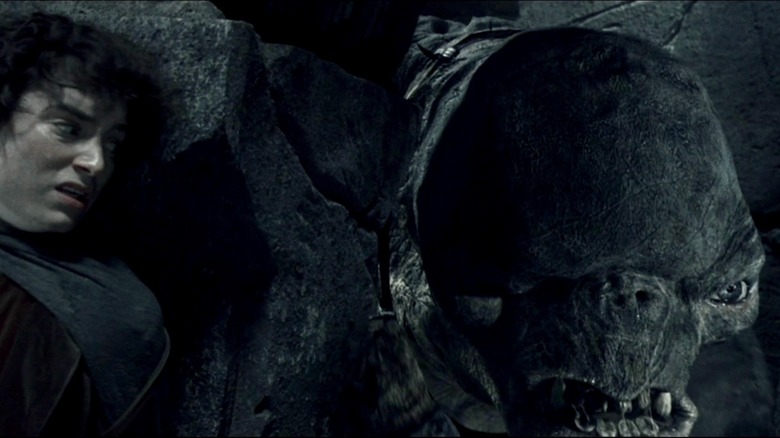The Rings Of Power Season Finale Showed It Can Meet All Your Expectations And Still Be Exciting
This article contains spoilers for "The Lord of the Rings: The Rings of Power" season 1.
Tearful goodbyes and too many endings: we've come to expect those from "The Lord of the Rings," and the season 1 finale of "The Rings of Power" didn't disappoint in that regard. Like "Andor," "The Rings of Power" is a prequel to a prequel ("The Hobbit," in this case), and the challenge any such narrative faces is: how do you engage viewers with a story when they already know how it will ultimately end? "The Hobbit" movie trilogy began with "An Unexpected Journey," but maybe all it and "The Rings of Power" could ever hope to be was a journey to an expected destination, with some unexpected developments along the way.
"Better Call Saul" skirted this issue slightly by being both a prequel and a black-and-white sequel at the same time. "The Rings of Power" has done it by finding ample room to maneuver within the cracks of the official canon. It's drawing from J.R.R. Tolkien's book lore, much of which has already been writ large in Peter Jackson movies. We know from the films, for instance, that Maxim Baldry's young Isildur isn't dead, though the "Rings of Power" narrative seemingly kills him off and lets the other characters believe he's gone for good.
Speculation about the identity of Sauron in "The Rings of Power" had begun even before the show premiered, with theorists incorrectly assuming, based on an early promo image, that the Eminem-looking "Dweller" (Bridie Sisson) was, in fact, the Dark Lord. She has serpentine eyes and a tendency to start forest fires — but no, that's not Sauron. However, even knowing or guessing who the real Sauron was didn't ruin the excitement of the finale.
The real Slim Sauron
"The Rings of Power" toys with audience expectations in its season 1 finale, beginning with a cold open where the Dweller and her two white-robed homies bow before the Stranger (Daniel Weyman) and say, "We come to serve you Lord Sauron." He, of course, isn't Sauron, either — it's just a misdirect. But it plays on what we saw in episode 5, where the Stranger manifested both destructive and creative powers, freezing and hurling a harfoot but also making trees grow back.
His storyline mirrors that of Halbrand (Charlie Vickers) in that it's a case of mistaken identity. We didn't always know if the Stranger was here to help or harm, but the finale comes down firmly on the side of him being good — by having him choose that for himself. In a way, he's like any impressionable young mind: born into this world (by falling from the stars), perhaps with a blank slate, to be nurtured toward good or evil by Nori Brandyfoot (Markella Kavenagh) or Slim Shady (sorry, Dweller).
While many fans may have watched the Stranger and thought, "If it looks like a wizard and wields power like one, then it probably is Gandalf, or maybe Saruman," "The Rings of Power" sort of set out to subvert the subversion of expectations with its fake-out reveal of Sauron's identity. I actually had the Sauron reveal spoiled for me beforehand — an occupational hazard of working on a news board where we have access to screeners and are able to pre-write before episodes have gone live to the general public. If anything, though, having foreknowledge of his true identity — as Halbrand — only increased the tension of his scenes with Lord Celebrimbor (Charles Edwards) and Galadriel (Morfydd Clark).
'Touch the darkness once more'
Knowing that Halbrand was Sauron put me (and maybe some fans who suspected it) in the same tense position as Galadriel. You can see when it begins to dawn on her that there's more to his friendly ring-forging suggestions than meets the eye. Then Celebrimbor starts talking about how the Elves are "on the cusp of creating a new kind of power," the "power of the unseen world," and it's like: uh-oh.
As Halbrand himself notes ("I told you that I had done evil and you did not care"), the show played fair in previous episodes, having him allude to his dark past and purloined crest and thereby giving the viewer enough information to suspect that the exiled king of the Southlands was really Sauron. There's a line in the finale where someone else says, "I cannot separate what is from what was, what was from what will be." That's the best place to be as a prequel viewer.
During the "Last Temptation of Galadriel" scene (as I like to think of it), "The Rings of Power" also gives new context for the film Galadriel's lines to Frodo about becoming a queen "stronger than the foundations of the earth." Watching her relationship with Halbrand unfold is like learning the juicy dirt on why two fantasy genre rock stars consciously uncoupled.
"Our paths are laid before us by powers greater than our own." I can only speak for myself as a casual fan, but "The Rings of Power" has reignited my interest in "The Lord of the Rings" franchise in a way I hadn't felt since a full decade ago, when there was all that hubbub going on about Peter Jackson exhibiting "The Hobbit" in 48 frames per second.
Outliving the hate (which is also to be expected)
Friends of Morgoth might still see "The Rings of Power" as a mercenary Prime Video endeavor, and of course, anyone's entitled to criticize the show without being labeled a fussy traditionalist or racist or cave troll (though I'd like to point out once more that this isn't the first time a troll has tried to break up a fellowship).
In the deicidal new religion of 21st-century fandom, it's become de rigueur that no prophet — or for-profit prequel or sequel — is without honor except in their own hometown and house. I've seen some post-finale social media reactions where people were likening "The Rings of Power" to a beautiful but hollow screensaver. Fair enough.
Personally, I think "The Rings of Power" season 1 showed a lot of heart and was as good as any serialized "Lord of the Rings" prequel could rightly expect to be. Granted, this season wasn't without a few bumps along the road. For example, even on the progressive Middle-earth of 2022, harfoots aren't immune to the Hollywood cliché of the Black character dying first (something the most recent episode of "Andor" was guilty of twice over).
Yet rather than hate-watching "The Rings of Power" or slagging it online, it seems like the healthy thing to do for non-fans after this would be to just disengage and focus on other sources of entertainment. (Trust me: I've done it with Marvel, and it works.) For all the rest of us, there's "The Rings of Power" season 2 to look forward to, and we can only hope that it manages to continue mining the mithril of viewer excitement even while fulfilling expectations and drawing closer to known events on the "The Lord of the Rings" timeline.



